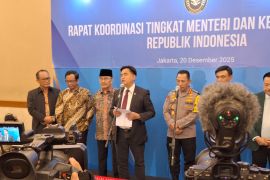"If the government deregulates, the value of fishery exports can be re-included in the list of the 10 largest foreign exchange earners in Indonesia, with a value of US$5.8 billion, and ranked 9th," Dahuri said in a release on Monday.
Dahuri explained that the export of palm oil and oleochemical products is the largest foreign exchange earner at present.
Then, he continued, the other biggest foreign exchange earners were tourism, textiles and garments, oil and gas, and coal.
He reminded that in 2014, Indonesian fishery product exports ranked 6th out of the top 10 foreign exchange earners.
However, from 2015 to 2018, fisheries exports did not enter again in the top 10 Indonesian foreign exchange-producing commodities, he added.
"The decline in fisheries export ratings is caused by the drop in the yield of tuna, skipjack, live crabs from aquaculture, groupers from aquaculture, and shrimps in Arafura," he revealed.
According to him, the drop in fisheries production was caused by various counterproductive regulations, such as a moratorium on the extension of permits for legally imported fishing vessels, transshipment bans, prohibition on the delivery of certain size crabs, and barriers to access of buyers.
In addition to deregulation, he also suggested that other steps must be taken to speed up the licensing and extension of licensing processes, and to develop "aquaculture" whose economic potential is $240 billion per year.
Another step is to apply modern technology for salt ponds, so that productivity increases by 400 percent. The quality also rises and practically it can supply all the needs of kitchen salt and in industries with a target to save foreign exchange from imported salt by $1.4 billion per year.
Another step is to optimize the installed capacity of the fish processing industry by ensuring that the supply of raw fish from the country has a potential fishing capacity of 12.5 million tons per year, with an export potential of around $12 billion per year.
Dahuri believes that if the steps are carried out, within 6 to 24 months, the Indonesian fishery sector could generate foreign exchange of around $5.8 billion; within 5 years, it could increase to $52 billion; and within one to two decades, it could increased to $252 billion per year.
"This foreign exchange is equivalent to 12 times the foreign exchange from palm oil, or about 164 percent of the Republic of Indonesia State Budget in 2018," he explained.
He stated that if the foreign exchange target is achieved simultaneously with the increase in foreign exchange from the other 10 mainstay sectors, the exchange rate of the rupiah could be stronger than Singapore. Foreign exchange reserves could surpass China, 40 million new jobs could be opened, poverty could decrease dramatically, and people`s purchasing power could increase by dozens of times. *** 1 *** (E002/INE)
Reporting by Muhammad Razi Rahman
Reporting by Eliswan, Otniel Tamindael
(T.SYS/A/KR-BSR/A/E002) 10-09-2018 17:00:07
Reporter: Antara
Editor: Andi Abdussalam
Copyright © ANTARA 2018











